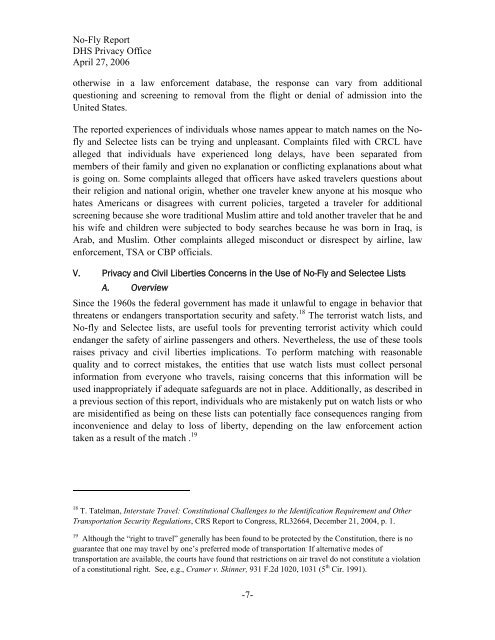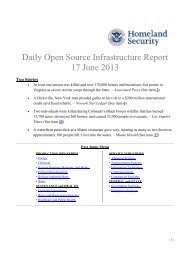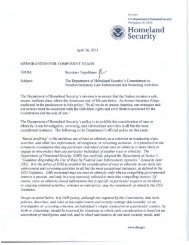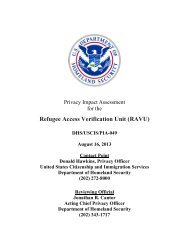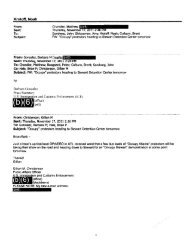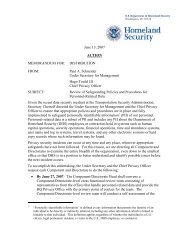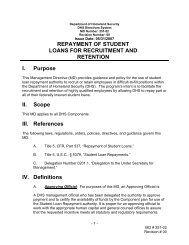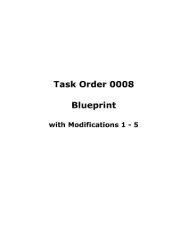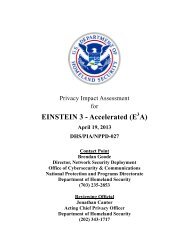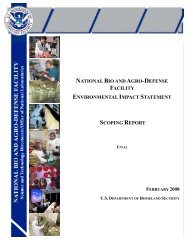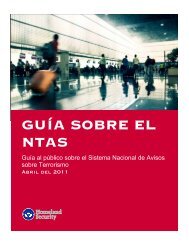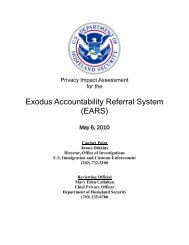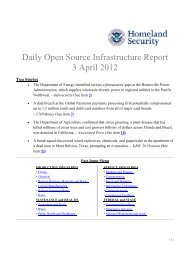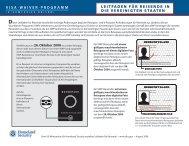Report: No Fly - Homeland Security
Report: No Fly - Homeland Security
Report: No Fly - Homeland Security
You also want an ePaper? Increase the reach of your titles
YUMPU automatically turns print PDFs into web optimized ePapers that Google loves.
<strong>No</strong>-<strong>Fly</strong> <strong>Report</strong><br />
DHS Privacy Office<br />
April 27, 2006<br />
otherwise in a law enforcement database, the response can vary from additional<br />
questioning and screening to removal from the flight or denial of admission into the<br />
United States.<br />
The reported experiences of individuals whose names appear to match names on the <strong>No</strong>fly<br />
and Selectee lists can be trying and unpleasant. Complaints filed with CRCL have<br />
alleged that individuals have experienced long delays, have been separated from<br />
members of their family and given no explanation or conflicting explanations about what<br />
is going on. Some complaints alleged that officers have asked travelers questions about<br />
their religion and national origin, whether one traveler knew anyone at his mosque who<br />
hates Americans or disagrees with current policies, targeted a traveler for additional<br />
screening because she wore traditional Muslim attire and told another traveler that he and<br />
his wife and children were subjected to body searches because he was born in Iraq, is<br />
Arab, and Muslim. Other complaints alleged misconduct or disrespect by airline, law<br />
enforcement, TSA or CBP officials.<br />
V. Privacy and Civil Liberties Concerns in the Use of <strong>No</strong>-<strong>Fly</strong> and Selectee Lists<br />
A. Overview<br />
Since the 1960s the federal government has made it unlawful to engage in behavior that<br />
threatens or endangers transportation security and safety. 18 The terrorist watch lists, and<br />
<strong>No</strong>-fly and Selectee lists, are useful tools for preventing terrorist activity which could<br />
endanger the safety of airline passengers and others. Nevertheless, the use of these tools<br />
raises privacy and civil liberties implications. To perform matching with reasonable<br />
quality and to correct mistakes, the entities that use watch lists must collect personal<br />
information from everyone who travels, raising concerns that this information will be<br />
used inappropriately if adequate safeguards are not in place. Additionally, as described in<br />
a previous section of this report, individuals who are mistakenly put on watch lists or who<br />
are misidentified as being on these lists can potentially face consequences ranging from<br />
inconvenience and delay to loss of liberty, depending on the law enforcement action<br />
taken as a result of the match . 19<br />
18 T. Tatelman, Interstate Travel: Constitutional Challenges to the Identification Requirement and Other<br />
Transportation <strong>Security</strong> Regulations, CRS <strong>Report</strong> to Congress, RL32664, December 21, 2004, p. 1.<br />
19 Although the “right to travel” generally has been found to be protected by the Constitution, there is no<br />
guarantee that one may travel by one’s preferred mode of transportation . If alternative modes of<br />
transportation are available, the courts have found that restrictions on air travel do not constitute a violation<br />
of a constitutional right. See, e.g., Cramer v. Skinner, 931 F.2d 1020, 1031 (5 th Cir. 1991).<br />
-7-


